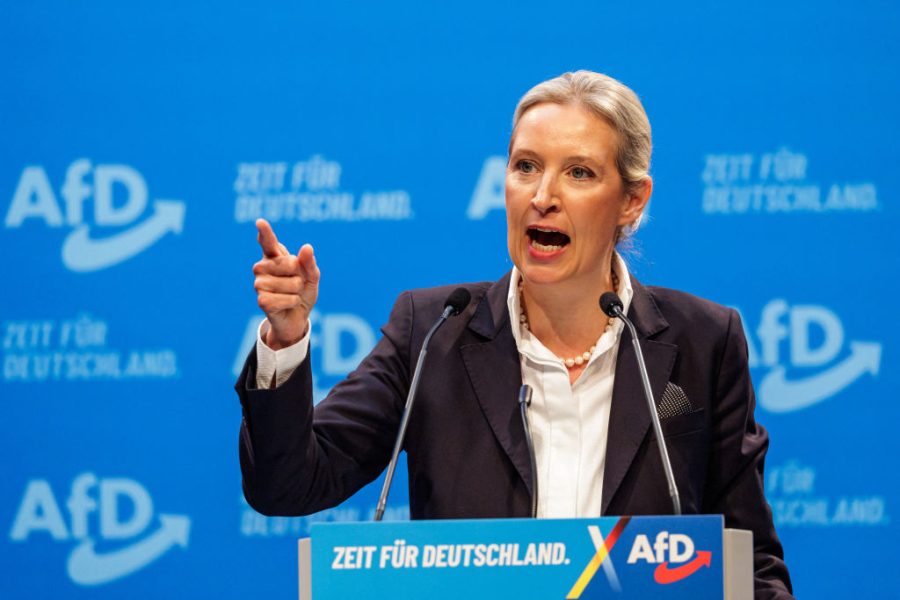Next month’s German federal election on 23 February revolves around the disputed meaning of a single toxic word: ‘remigration’. Until the current fiercely fought campaign began, the word was an unmentionable taboo in German politics for obvious historical reasons, since, according to left-wing linguists, it suggested comparison between the deadly forced deportation of Jews by the Nazis during the Holocaust with the way that unwelcome immigrants are treated in today’s Germany.
But at the weekend that taboo was shattered by Alice Weidel, co-leader of the hard right Alternative für Deutschland (AfD) party, when she used the ‘verboten’ word while launching the insurgent party’s election campaign in its East German heartland. Weidel – who is on the moderate wing of her party and lives in Switzerland herself with her Sri Lankan woman partner – promised that if the AfD won a share of power, their government would close Germany’s borders and begin mass deportations within 100 days. ‘If that means “remigration” then call it “remigration”,’ she added to applause.
In Germany, the hard right AfD is still not yet seen as ‘salonfähig’
It wasn’t immediately clear whether Weidel was threatening to deport migrants who have been convicted of crimes, or referring to wider categories of ethnically foreign people – even those born in Germany. The vagueness may be deliberate: Weidel’s way of avoiding details when telling her supporters what they want to hear – that a government with the AfD in it will take tough action against immigrants.
Weidel has been successfully wooing the support of the world’s richest man, Elon Musk, in long trans-Atlantic phone calls. As a result, Musk tweeted on X that the AfD represents Germany’s ‘last hope’. The high-tech billionaire, who will be President Trump’s efficiency tsar, also wrote an op-ed article in Die Welt newspaper over the festive period endorsing the insurgents.
But although the AfD is running second in the election race on around 22 per cent to the centre right CDU/CSU on 30 per cent, it has next to no chance of joining a government, however well it performs at the polls. This is because all the mainstream German parties have built a ‘Brandmauer’ (firewall) against the party, refusing to work with the newcomers at all levels of government, local and national.
The AfD’s growth since it’s foundation in 2013 has been so spectacular, and so worried are voters about immigration, that the man who is almost certain to actually become Chancellor next month, Friedrich Merz, leader of the centre-right CDU, has also played with the ‘remigration’ concept – albeit in a different way to Weidel. In an interview with the Welt am Sonntag newspaper at the weekend, Merz said that a CDU-led government would ‘at the very least’ consider revoking the German citizenship of naturalised migrants convicted of crimes, though he stopped short of threatening to deport them.
Merz, a 69-year old businessman and wealthy commercial lawyer, has shifted his party to the right of the former CDU Chancellor Angela Merkel, who admitted more than a million Syrian refugees to the country in 2014. The AfD are snapping at the heels of the CDU after topping the polls last year in local state elections in eastern Germany, but so far Merz has refused to crack the anti-AfD firewall, and has vowed to act against any CDU branch that considers cooperating with them.
If he maintains that stance after the election he will be forced into a coalition with either the Left-wing Social Democrats of outgoing Chancellor Olaf Scholz, or the Greens, both polling around 15 per cent, as his only other potential partner, the pro business Liberal FDP, looks unlikely to win enough votes to make it back into the Bundestag Parliament at all.
Meanwhile, in neighbouring Austria, a similar firewall erected against the hard right Austrian Freedom party (FPÖ) has collapsed. Herbert Kickl, the party’s controversial leader, looks likely to become the first FPÖ Chancellor in the Austrian republic’s history.
The FPÖ won last autumn’s election on a platform of curbing immigration and cracking down on immigrant rights and benefits. Kickl’s rhetoric on the subject was deemed so inflammatory by the other parties that after he won the election they tried to form a government without him. However, after their efforts collapsed last week, the centre right Chancellor Karl Nehammer resigned, and President Van Der Bellen ordered Nehammer’s successor as interim Chancellor, Foreign Minister Alexander Schallenberg, to begin negotiating with the FPÖ to invite it into the government as senior partner with Schallenberg’s centre-right People’s party (ÖVP).
Although the Austrian situation mirrors that in Germany – with immigration topping the political agenda of voters’ angst in both – in Germany, the hard right AfD is still not yet seen as ‘salonfähig’ (respectable in polite society). It is being firmly held at bay, and is even being investigated by Germany’s internal intelligence agency for suspected banned neo-Nazi attitudes and ties and using their slogans. But in a democracy, if the AfD as expected increases its support on a national level next month, it may not be possible to keep it out in the cold for much longer.







Comments